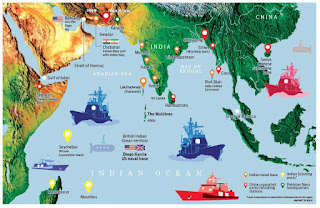Colombian Mercenaries in Demand
Photo source: The New Arab
By Naveed Qazi | Editor, Globe Upfront
Mercenaries change warfare in profound ways. They commercialise it, and Colombian mercenaries are in demand because of their good value. It is because they have considerable clout in their field, as they fought FARC rebels in the past. They are willing to pursue early retirement and confront a meagre pension, making contractual mercenary work enticing for themselves.
Middle East has become a lucrative ground for Colombian mercenaries, with soldiers involved across Yemen, Libya, Iraq, Afghanistan and the UAE. The Middle East is a hotspot because it is a ‘conflict market’. There is also a tradition in the Middle East of hiring foreign mercenaries and it is not considered a taboo. Wealthy people and wealthy governments are willing to pay a lot of money. The mercenaries have been lured by salaries more than eight times larger than what they would receive as retirees in Colombia.
It was in 2015 when New York Times first revealed that hundreds of Colombian mercenaries had been contracted by the UAE to fight Houthi rebels in Yemen. The recruits were paid between $2,000 to $3,000 a month, with $1,000 bonuses for those deployed directly to Yemen for the toughest missions. Sometimes, the money paid even went up to $7,000 a month, and the mercenaries were lured with additional benefits such as immediate Emirati citizenship, a privilege extended to their immediate family members, alongside free access to public healthcare and education for their children.
According to a Times article, the UAE military has taken control of a program to hire mercenaries that had been originally headed by a private US firm hired by Erik Prince, founder of Blackwater Worldwide, a company that provides security services to the Pentagon, principally in Iraq and Afghanistan. Then, Times reported that after Blackwater stopped recruiting mercenaries, the job went to Global Enterprises, a Colombian firm run by Oscar Garcia Batte, a former commander of special operations in Colombia’s army who once commanded the Colombian troops in the UAE, and was deployed in Yemen. Other sources say this task of recruiting mercenaries is actually done by a Colombian company called ID Systems Ltd. The first journalist to mention ID Systems was Nathalia Hernandez in Don Juan, a magazine published by the daily El Tiempo. Hernandez was the first reporter to write about the presence of mercenaries in Yemen. Her story, published in February 2015, was particularly valuable because she lived with one of the mercenaries in Abu Dhabi for twelve months.
Blackwater actually contracted ID Systems Ltd to recruit men who were usually not on ‘active duty’. Most of the men who trained in the program were retirees and were in trouble for human rights violations. Although, some were on active duty as well. The Colombian government kept silent after Hernadez’s article was published. She specifically used the term ‘responsible for false positives’, where killings by the mercenaries were made to look like combat fatalities.
Colombian guns for hire also featured in the Libyan civil war in 2011, with reports suggesting that they fought loyalist Gaddafi forces, as well as anti-Gaddafi rebels. Some also got killed in the Yemeni city of Taiz, and some got killed when anti-Gaddafi rebels raided a Gaddafi compound.
However, Colombian mercenaries are also recruited for doing more menial tasks. In 2011, Colombian military veterans had been recruited to defend oil pipelines and skyscrapers. Previously, in 2006, Colombian mercenaries deceived themselves in undertaking private security work in Iraq.
An investigation by the Colombian outlet Semana revealed a Blackwater-owned company in Bogota had hired the veterans for a lucrative six-month security job to defend US military bases in the area. Despite being promised a salary of $7,000 per month, the veterans only received $1,000 a month and were forced to see out the duration of their contracts in Baghdad.
The transition programs to a civil life usually don’t work well for them. Years of war leave a certain psychological trauma, and it leaves soldiers helpless. Many feel ostracised, with their profession and identity lost in limbo. Some face precarious job opportunities, and pensions that don’t allow them a good quality of life. Thus, these kinds of private industries are something not so tempting because they have economic and psychological instability.
The lack of accountability and the lack of clear international and domestic law is one of the reasons that this industry is flaming abroad. That's why nation-states that already have strong militaries are turning to mercenaries because if things do go wrong, they could disown them, fire them, or even prosecute them. They would never do that to their own troops. That’s where the moral dilemma lies.




Comments
Post a Comment
Advice from the Editor: Please refrain from slander, defamation or any kind of libel in the comments section.